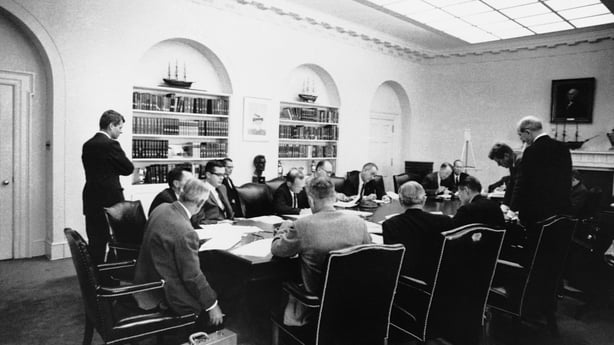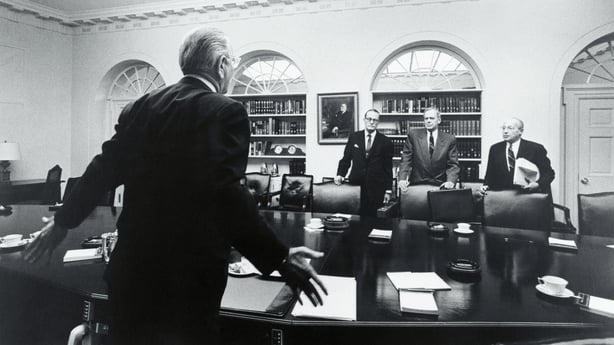Analysis: recordings like those involved in cases against Donald Trump have a long history stretching back over 60 years
Recordings of former US president Donald Trump have played a pivotal role in his most recent criminal indictments. A recording where he seems to indicate he is holding a classified document has punctured his declassification defence, While his call with Georgia Secretary of State Brad Raffensperger pressuring him to 'find 11,780 votes' to overturn the state’s presidential election result has directly led to his imminent legal peril in both election interference cases.
Presidential recordings have a long, murky history stretching back over 60 years. In fact, seven of the last 15 presidents of the United States have made recordings and two of these have faced criminal prosecution or impeachment, partly as a result of recordings.
The first three 'recorder’ presidents produced largely scattered recordings - President Franklin D. Roosevelt only produced eight hours of tapes, mostly of selectively-recorded press conferences, for example, while his successor Harry Truman’s recordings emerged largely unintelligible.
We need your consent to load this rte-player contentWe use rte-player to manage extra content that can set cookies on your device and collect data about your activity. Please review their details and accept them to load the content.Manage Preferences
From RTÉ News, Georgia charges Trump with trying to overturn 2020 election
President John F. Kennedy began the trend of systematic recordings while in office via a system of tape recorders installed in the cabinet room, the Oval Office (taping both his in-person and telephone conversations) and possibly an additional telephone recorder in his bedroom as well. It has never been known exactly why Kennedy opted for such an extensive recording infrastructure, although it is suggested that, in the wake of the Bay of Pigs fiasco, chastened by advisers changing position in retrospect, the president desired an accurate record of events.
Whatever the reason, Kennedy’s presidential chronicles and those that followed offer a unique insight into the workings and actions of America’s presidents. Most famously, the recordings offered an insider’s view of the administration’s decision-making during the Cuban Missile Crisis. The agonising debates over a range of options – between the military’s preference for air strikes against the Soviet nuclear missiles followed by an amphibious invasion of the island, to the option of ‘quarantining’ the island which was eventually adopted - were captured for posterity by Kennedy’s concealed cabinet room recorder, unbeknownst to the other participants in the discussions.
President Lyndon Johnson would continue the practice upon succeeding his slain predecessor, recording about 800 hours of telephone conversations. Johnson’s initial doubts and his growing anguish over the war in Vietnam are laid bare on the tapes, which bear witness not only to his private admission that the war, which he called ‘just the biggest damn mess I ever saw’ was unwinnable, but also to his fear that Congress would ‘impeach a president, though, that would run out, wouldn’t they?’

The tapes also showcased his telephonic application of the famed 'Johnson Treatment', the use of his famed mix of charm and bad-tempered outburst to coax those around him. Once, when his policy adviser was unavailable to take a call from the president because he was using the bathroom, Johnson can be heard instructing him to have one installed in the restroom. When the same thing happened the next day, the tape reveals, Johnson can be heard screaming at his advisor’s unwitting secretary.
President Richard Nixon's return to the wider Kennedy-era recording system would be his undoing in a way that parallels Donald Trump’s legal woes today. With a view to writing his post-presidency memoirs the 37th president felt that note-taking did not accurately reproduce the nuances of the key moments of his presidency, so he had an elaborate system of recorders installed spread across various locations, particularly around the White House and Camp David.

The Nixon recordings exposed Nixon's antisemitism - the president was recorded regularly complaining of a Jewish conspiracy within the federal government - while, like his predecessors, the tapes also chronicled the inner workings of Nixon’s foreign policy, particularly the machinations and frustrations around the Paris peace talks with North Vietnam.
Nixon’s tapes would go from political dynamite to the prime evidence of criminal culpability when a team of Nixon-sanctioned fixers broke into the Democratic Party’s Washington offices. Nixon denied all knowledge of the Watergate break-in for over a year and would likely have escaped direct culpability were it not for the absence of a 'STOP’ button on his recorders. Technologically inept, various arrangements were tried to facilitate Nixon’s ability to turn the recorders on or off, but Nixon would forget to activate the recorder – in the end, a voice-activated recorder was adopted; one that was always on.
We need your consent to load this rte-player contentWe use rte-player to manage extra content that can set cookies on your device and collect data about your activity. Please review their details and accept them to load the content.Manage Preferences
From RTÉ Archives, on 8 August 1974 President Richard Nixon announced his resignation as the 37th President of the United States
A recording of a meeting between Nixon and his chief of staff which became known as one of several 'smoking gun' tapes captured the president seeking to shutter the FBI’s investigation. Just as Donald Trump’s legal woes are underpinned by his own recorded words, Nixon’s own recordings lived to eventually become his undoing.
But the immediate peril is far greater for Trump than it was even for Nixon. Whereas Nixon was facing Congressional impeachment before he resigned upon losing the backing of congressional Republicans, Trump is now facing several sets of criminal charges, much of the evidence for which is underpinned by audio recordings of his own utterances.
Read more: Why do Trump supporters remain so loyal to him?
As is unfolding today in Trump’s indictments, it fell to the courts to disentangle the political maelstrom Watergate created. Only while Trump has framed executive privilege to justify his hoarding classified material, Nixon invoked executive privilege to prevent the release of the incriminatory Watergate recordings as, he argued, they related to the sensitive official business of the executive branch.
In an eerie echo of the FBI raid on Trump’s Mar-a-Lago resort, after initially handing over only edited tapes to the Congressional House Judiciary Committee investigating the Watergate scandal, President Nixon was ultimately compelled by the Supreme Court to surrender the evidence that would end his presidency. He would resign to avoid impeachment on August 9th, 1974.
The views expressed here are those of the author and do not represent or reflect the views of RTÉ







